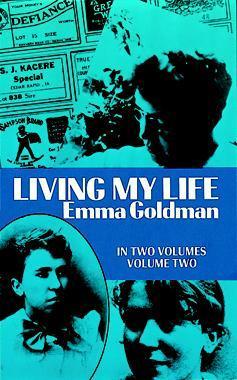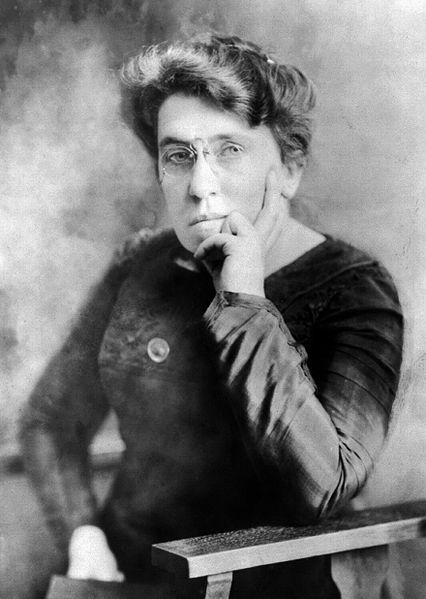
“You damn bitch of an anarchist, I wish I could get at you. I would tear your heart out and feed it to my dog.” This was one of the less obscene messages received by Emma Goldman (1869-1940), while in jail on suspicion of complicity in the assassination of McKinley. The most notorious woman of her day, she was bitterly hated by millions and equally revered by millions. The strong feelings she aroused are understandable. She was an alien, a practicing anarchist, a labor agitator, a pacifist in World War 1, an advocate of political violence, a feminist, a proponent of free love and birth control, a communist, a street-fighter for justice—all of which she did with strong intellect and boundless passion. Today, of course, many of the issues that she fought over are just as vital as they were then. Emma Goldman came from Russia at the age of 17. After an encounter with the sweatshop and an unfortunate marriage, she plunged into the bewildering intellectual and activist chaos that attended American social evolution around the turn of the twentieth century. She knew practically everyone of importance in radical circles. She dominated many areas of the radical movement, lecturing, writing, haranguing, and publishing to awaken the world to her ideas. After World War I she was deported to Russia, where she soon discovered that anarchists were no better liked than in America, despite Lenin’s first gesture of welcome. She escaped with her life but never was allowed to return to the United States. Emma Goldman was a devastatingly honest woman, who spared herself as little as she spared anyone else. From her account the reader can gain insight into a curious personality type of recurrent a woman who devoted her life to eliminating suffering, yet could make a bomb or assist in staging an assassination. Equally interesting are her comments on other radicals of the period, such as Kropotkin, Berkman, Mooney, Lenin, Trotsky, Haywood, Most, the Haymarket martyrs, and many others. Her autobiography, written with vigor, ranks among the finest in the English language.
Author

Emma Goldman was a feminist anarchist known for her political activism, writing and speeches. She played a pivotal role in the development of anarchist political philosophy in North America and Europe in the first half of the twentieth century. Born in Kovno in the Russian Empire (present-day Kaunas, Lithuania), Goldman emigrated to the US in 1885 and lived in New York City, where she joined the burgeoning anarchist movement.Attracted to anarchism after the Haymarket affair, Goldman became a writer and a renowned lecturer on anarchist philosophy, women's rights, and social issues, attracting crowds of thousands. She and anarchist writer Alexander Berkman, her lover and lifelong friend, planned to assassinate Henry Clay Frick as an act of propaganda of the deed. Although Frick survived the attempt on his life, Berkman was sentenced to twenty-two years in prison. Goldman was imprisoned several times in the years that followed, for "inciting to riot" and illegally distributing information about birth control. In 1906, Goldman founded the anarchist journal Mother Earth. In 1917, Goldman and Berkman were sentenced to two years in jail for conspiring to "induce persons not to register" for the newly instated draft. After their release from prison, they were arrested—along with hundreds of others—and deported to Russia. Initially supportive of that country's Bolshevik revolution, Goldman quickly voiced her opposition to the Soviet use of violence and the repression of independent voices. In 1923, she wrote a book about her experiences, My Disillusionment in Russia. While living in England, Canada, and France, she wrote an autobiography called Living My Life. After the outbreak of the Spanish Civil War, she traveled to Spain to support the anarchist revolution there. She died in Toronto on May 14, 1940, aged 70. During her life, Goldman was lionized as a free-thinking "rebel woman" by admirers, and derided by critics as an advocate of politically motivated murder and violent revolution.Her writing and lectures spanned a wide variety of issues, including prisons, atheism, freedom of speech, militarism, capitalism, marriage, free love, and homosexuality. Although she distanced herself from first-wave feminism and its efforts toward women's suffrage, she developed new ways of incorporating gender politics into anarchism. After decades of obscurity, Goldman's iconic status was revived in the 1970s, when feminist and anarchist scholars rekindled popular interest in her life.